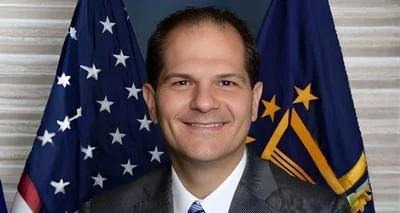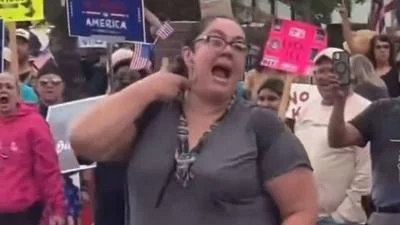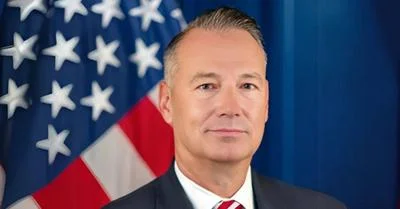Michael Crawford, Illinois State Representative for 31st District | https://www.ilga.gov/house/Rep.asp?GA=104&MemberID=3452
Michael Crawford, Illinois State Representative for 31st District | https://www.ilga.gov/house/Rep.asp?GA=104&MemberID=3452
According to the Illinois General Assembly site, the legislature summarized the bill's official text as follows: "Amends the Higher Education Student Assistance Act. Provides that the Illinois Student Assistance Commission shall establish the Adult Learner Flexible Education Grant Program to facilitate access to online postsecondary education provided by a qualified institution of higher learning, including a not-for-profit postsecondary institution that offers classes exclusively online and meets other criteria, for adults over the age of 25 pursuing careers in fields facing workforce shortages, as determined by the Commission. Provides that, beginning with the 2025-2026 academic year, subject to appropriation, the Commission shall receive and consider applications for grant assistance. Provides that an applicant is eligible for a grant if the Commission finds that the applicant meets specified criteria. Provides that all grants are applicable only to tuition and mandatory fees. Provides that the Commission shall determine the grant amount for each student, which amount must not exceed $5,000. Sets forth provisions concerning conditions on the grant amount, grant applications, the distribution of grant funds, and rulemaking. Effective July 1, 2025."
The following is our breakdown, based on the actual bill text, and may include interpretation to clarify its provisions.
In essence, the bill establishes the Adult Learner Flexible Education Grant Program to enhance access to online postsecondary education for Illinois residents over the age of 25 pursuing careers in fields facing workforce shortages. Beginning in the 2025-26 academic year, the program will provide grants, subject to appropriation, covering tuition and mandatory fees up to $5,000. Eligibility criteria include Illinois residency, enrollment in qualified online institutions, and proof of financial need. The Illinois Student Assistance Commission will oversee the application process and distribution of funds, prioritizing students with significant financial need, first-generation students, minority students, and those in rural areas. The program becomes effective July 1, 2025.
Michael Crawford has proposed another four bills since the beginning of the 104th session.
Crawford graduated from Northeastern Illinois University with a BS.
Michael Crawford is currently serving in the Illinois State House, representing the state's 31st House District. He replaced previous state representative Mary E. Flowers in 2025.
Bills in Illinois follow a multi-step legislative process, beginning with introduction in either the House or Senate, followed by committee review, floor debates, and votes in both chambers before reaching the governor for approval or veto. The General Assembly operates on a biennial schedule, and while typically thousands of bills are introduced each session, only a fraction successfully pass through the process to become law.
You can read more about bills and other measures here.
| Bill Number | Date Introduced | Short Description |
|---|---|---|
| HB3551 | 02/07/2025 | Amends the Higher Education Student Assistance Act. Provides that the Illinois Student Assistance Commission shall establish the Adult Learner Flexible Education Grant Program to facilitate access to online postsecondary education provided by a qualified institution of higher learning, including a not-for-profit postsecondary institution that offers classes exclusively online and meets other criteria, for adults over the age of 25 pursuing careers in fields facing workforce shortages, as determined by the Commission. Provides that, beginning with the 2025-2026 academic year, subject to appropriation, the Commission shall receive and consider applications for grant assistance. Provides that an applicant is eligible for a grant if the Commission finds that the applicant meets specified criteria. Provides that all grants are applicable only to tuition and mandatory fees. Provides that the Commission shall determine the grant amount for each student, which amount must not exceed $5,000. Sets forth provisions concerning conditions on the grant amount, grant applications, the distribution of grant funds, and rulemaking. Effective July 1, 2025. |
| HB3460 | 02/07/2025 | Amends the Barber, Cosmetology, Esthetics, Hair Braiding, and Nail Technology Act of 1985. Provides that all apprentices shall be employed under an apprenticeship agreement between the sponsoring salon or shop and the apprentice that is approved by the Department of Labor. Provides requirements for the completion of an apprenticeship program, including training hours and supplemental instruction. Provides that an apprentice shall only provide licensed services under the supervision of a cosmetologist, barber, esthetician, or nail technician with an active license and for the scope of services for which the supervising licensed professional is licensed to practice. Requires apprentices to be trained in all branches of practical work and related supplemental instruction for the scope of practice for the license the apprentice seeks to obtain. Defines "apprentice". Provides that a person is qualified for a license as a barber if the person has graduated from a school of barbering or school of cosmetology approved by the Department of Financial and Professional Regulation or completed an apprenticeship under the Act (rather than only if the person has graduated from a school). Provides that the Department shall prescribe reasonable rules for the registration of apprentices. |
| HB3815 | 02/07/2025 | Amends the Personnel Code. Requires the Director of Central Management Services to consult with the Department of Employment Security, the Department of Human Services, and other disability experts for the purpose of establishing, reviewing, and modifying the qualifying procedures under the Code for applicants whose disabilities are of such a significant nature that the applicants are unable to demonstrate their abilities in the ordinary selection process. Provides that all permanent executive branch classified positions are eligible for a 700-hour on-the-job demonstration experience, and all permanent classified job postings must provide information regarding the on-the-job demonstration overview and certification process. Provides that the Director of Central Management Services is responsible for the administration and oversight of the 700-hour on-the-job demonstration experience, including the establishment of policies and procedures, data collection and reporting requirements, and compliance. Provides that the Director of Central Management Services shall design and implement a training curriculum for the 700-hour on-the-job demonstration experience. Provides that all executive leaders, managers, supervisors, human resources professionals, affirmative action officers, and ADA coordinators must receive annual training on the program. Provides that the Director of Central Management Services shall develop, administer, and make public a formal grievance process for individuals in the 700-hour on-the-job demonstration experience. Effective immediately. |
| HB3817 | 02/07/2025 | Amends the Code of Civil Procedure. Provides that a petition for a certificate of innocence shall state facts in sufficient detail to permit the court to find that the petitioner is likely to succeed at trial in proving that the petitioner is innocent of the alleged offenses for which the person was convicted (rather than innocent of the offenses charged in the indictment or information) or that his or her acts or omissions for which he or she was convicted (instead of for those charged in the indictment or information) did not constitute a felony or misdemeanor against the State of Illinois. Provides that in order to obtain a certificate of innocence, the petitioner must prove by a preponderance of the evidence that the petitioner is innocent of the alleged offenses for which he or she was convicted (rather than offenses charged in the indictment or information) or that his or her acts or omissions for which he or she was convicted (instead of those charged in the indictment or information) did not constitute a felony or misdemeanor against the State of Illinois. Provides that the changes made by the amendatory Act apply to petitions filed on and after September 22, 2008. |
| HB3818 | 02/07/2025 | Amends the Court of Claims Act. Provides that the Court of Claims has exclusive jurisdiction to hear all claims against the State for time unjustly served in State prisons, in county jails, on parole, on intensive supervised probation, or registered as a sex offender if the person was unjustly convicted and received a pardon from the Governor on the ground of innocence of the crime for which the person was convicted or the person received a certificate of innocence. Removes language providing the amount of the award the court may give for a successful claim. Provides instead that the court shall make an award of $50,000 per year during which the person was wrongfully incarcerated and $25,000 for each year during which the person was wrongfully on parole, wrongfully on intensive supervised probation, or wrongfully required to register as a sex offender. Provides that the changes made by the amendatory Act apply to claims pending or filed on or after the effective date of the amendatory Act. Amends the Code of Civil Procedure. Allows any person who is convicted or adjudicated a delinquent and then serves any part of a sentence of incarceration in a State prison, in a county jail, on parole, on intensive supervised probation, or registered as a sex offender (rather than convicted and subsequently imprisoned) for one or more felonies by the State that the person did not commit may file a petition for certificate of innocence. Requires the court to make an award of reasonable attorney's fees, costs, and expenses after awarding a certificate of innocence. Provides that any person seeking a certificate of innocence based on the dismissal of a juvenile delinquency petition or an acquittal that occurred before the effective date of the amendatory Act shall file a petition within 4 years after the effective date of the amendatory Act, and any person seeking a certificate of innocence based on the dismissal of a juvenile delinquency petition or an acquittal that occurred on or after the effective date of the amendatory Act shall file a petition within 2 years after the dismissal or acquittal. Effective immediately. |
| HB3846 | 02/07/2025 | Amends the Department of Human Services Act. Creates the Underserved Populations Autism Task Force within the Department of Human Services. Requires the Task Force to develop an Autism Spectrum Disorder Strategic Plan for underserved populations that focuses on: (1) improving awareness, early diagnosis, and intervention; and (2) ensuring delivery of treatment and services for individuals diagnosed with an autism spectrum disorder, including the coordination and accessibility of cost-effective treatments and services throughout the individual's lifetime. Requires the Task Force to submit its strategic plan to the Governor, the General Assembly, and the Department of Human Services by no later December 31, 2030. Requires the Task Force to submit annual reports each July 1 for calendar years 2026, 2027, 2028, 2029, and 2030. Requires the annual reports to detail Task Force meetings and activities, summarize Task Force hearings and findings, and give an account of any progress the Task Force has made towards developing the Autism Spectrum Disorder Strategic Plan. Contains provisions on Task Force membership and meetings. Provides that the Task Force is dissolved on July 1, 2031. Effective July 1, 2025. |
| HB2958 | 02/05/2025 | Amends the Board of Higher Education Act. Requires the Board of Higher Education, in consultation with the Department of Commerce and Economic Opportunity and the Department of Employment Security, to develop a career and education guide for postsecondary students with disabilities. Sets forth the included information in the career and education guide. Requires the guide to be publicly available on the websites of the Board, the Department of Commerce and Economic Opportunity, and the Department of Employment Security. Allows the Board to publish physical copies and charge a reasonable fee for such copies. Requires the first guide to be published by August 1, 2026, and every August 1 thereafter. Effective January 1, 2026. |
| HB2435 | 02/03/2025 | Amends the Telephone Solicitations Act. Provides that no person shall solicit the sale of goods or services in the State through automatic dialing, the use of an auto dialer, or the use of a computer program designed to mimic a human operator, unless the person being contacted has expressly consented to be contacted in this manner. Provides that, if a person has previously consented to be contacted in the manner otherwise prohibited, the consent shall only be valid for a period of one year and the person shall be allowed to withdraw that consent at any time in the same manner that the consent was given. Provides that a person to whom consent has been given shall not sell, give, transfer, or assign that consent to another person. Provides for exemptions to the provision. Provides that any customer who is subject to a violation of the provision may bring an action for damages of $500 per violation, plus costs and reasonable attorney's fees. Makes a change to the definition of "emergency telephone number". |
| HB1366 | 01/14/2025 | Amends the Children with Disabilities Article of the School Code. Provides that a school shall provide written notice to the parents or guardian of a child with disabilities that the parents or guardian have the right to have an individualized education program (IEP) advocate present at any meeting regarding the child's current or prospective individualized education program and that the parents or guardian have the right to ask for an IEP facilitator for the child's IEP. Provides that the school may provide the written notification as a part of other provided documentation, including, but not limited to, admission and enrollment documents. |






 Alerts Sign-up
Alerts Sign-up